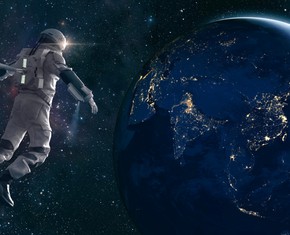The views expressed in our content reflect individual perspectives and do not represent the authoritative views of the Baha'i Faith.
Did you hear about the online debate at the “Intelligence Squared” forum between the atheists and the Christians? The atheists won.
A while back some Baha’i colleagues and I read the transcript of that Intelligence Squared forum debate on the motion “Science Refutes God.” We each considered the implications and wrote commentary on them. The essays in this series reflect my thoughts on the science vs. God question.
In the Intelligence Squared forum, two teams debated the motion that science refutes God. Team A (for Atheist), composed of Michael Shermer (American science writer, science historian and founder of The Skeptics Society) and Lawrence Krauss (Canadian-American theoretical physicist, cosmologist and professor of physics) argued for the proposition that “Science refutes God.”

Team B (for Believer), arguing that “science SO does not refute God,” were Dinesh D’Souza (Indian-American conservative political commentator, author and former President of The King’s College, NY), and Ian Hutchinson (Professor of Nuclear Science and Engineering at Massachusetts Institute of Technology). Both members of Team B were Christians, although neither was raised in their faith.
My general impression of the debate, which the two Christian scientists lost by several points in an audience vote, was that Team B undermined their position by trying to argue specifically and narrowly Christian doctrine, as opposed to making rational arguments for the existence of God, the evidences of Whom go far beyond a singular Christian context.
In the course of bringing Christian doctrine to the table, Ian Hutchinson said, “Of course, you know Christians think that Jesus was the son of God.” This simple sound bite opened up an unanswerable array of questions that were tangential but crucial to an understanding of God. One question being: “What does it mean to say that a seemingly human man 2000 years ago was the only progeny of an non-corporeal, supernatural entity?”
This observation opened the door further to the subject of original sin and salvation, allowing Team A to close their argument by asking the audience to bear in mind that Team B believed that Jesus Christ:
…is your savior, and you accept him for redeeming us for sins we never committed. Somebody else in the past committed them. So as I understand this, God sacrifices himself to himself to save us from himself. If that sounds as incomprehensible to you as it does to me, I urge to you vote for our side.
Stated that way, it does sound pretty incomprehensible and irrational. The audience, given a false choice between science or a God based on that narrow caricature, voted against such a God. I would too, for both scientific and religious reasons.
Unfortunately, no one raised a very critical point during the debate: that this caricature is not the only portrait of God available. It is not even a majority viewpoint in the world of religion. The teams debated whether science refutes God, not whether science refutes one specific sectarian dogma or doctrine about God. Yet that was what the atheist team refuted. Hutchinson and D’Souza helped them do it, in part, by failing to speak a common language—that of reason.
In the writings of the Baha’i Faith, both Baha’u’llah and Abdu’l-Baha encourage a reasoned, rational approach to everything, including God and religion:
The third teaching or principle of Baha’u’llah is that religion and science are in complete agreement. Every religion which is not in accordance with established science is superstition. Religion must be reasonable. If it does not square with reason, it is superstition and without foundation. It is like a mirage, which deceives man by leading him to think it is a body of water. God has endowed man with reason that he may perceive what is true. If we insist that such and such a subject is not to be reasoned out and tested according to the established logical modes of the intellect, what is the use of the reason which God has given man? – Abdu’l-Baha, The Promulgation of Universal Peace, p. 63.
In the debate Team A, and those who accepted their explanation, believed that by rejecting their own understanding of a single sectarian doctrine, they were rejecting God. That made for a nice, neat conclusion—but one that does not reasonably follow. Reason, as Christ reminds his followers frequently, is the tool we use to independently investigate reality:
You will know them by their fruits. Do men gather grapes from thornbushes or figs from thistles? Even so, every good tree bears good fruit, but a bad tree bears bad fruit. A good tree cannot bear bad fruit, nor can a bad tree bear good fruit. Every tree that does not bear good fruit is cut down and thrown into the fire. Therefore by their fruits you will know them. – Matthew 7:16-20.
Reason, the Baha’i teachings say, is one of the greatest gifts bestowed on humankind by a rational God:
God has given man the eye of investigation by which he may see and recognize truth. He has endowed man with ears that he may hear the message of reality and conferred upon him the gift of reason by which he may discover things for himself. This is his endowment and equipment for the investigation of reality. – Abdu’l-Baha, The Promulgation of Universal Peace, p. 293.
So let’s use reason to rationally follow the points made in this interesting debate, and decide for ourselves whether science really refutes God.
You May Also Like
Comments

















I have read those books ("A Scientific Proof of the Existence of God" and "minimalism") and as enginneer I have not found any major error in the demonstration.
I think that this demonstration is not well known because it does not match the view of God by most of religions and is neglected by the scientific community. But ...it could be a major bridge between the scientific and religiouse communities.
Seraphim Rose, Nihilism: The Root of the Revolution of the Modern Age
This is a very old demonstration coming from Aristote and reviewed by Avicenna (Ibn Sina).
In conclusion, I don't know why is demonstration is no wider know by the scientific and religiouse communities in the world because is an exceptional bridge between them.